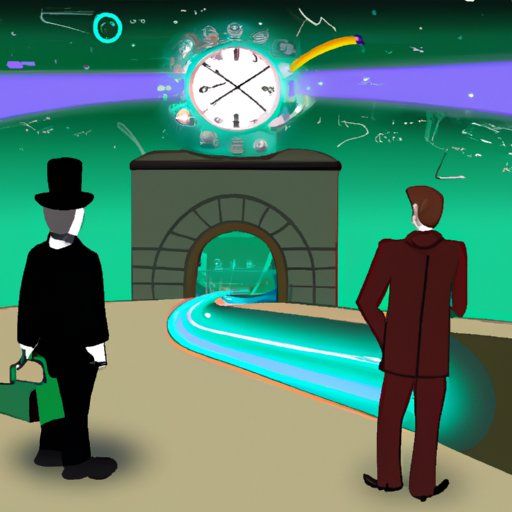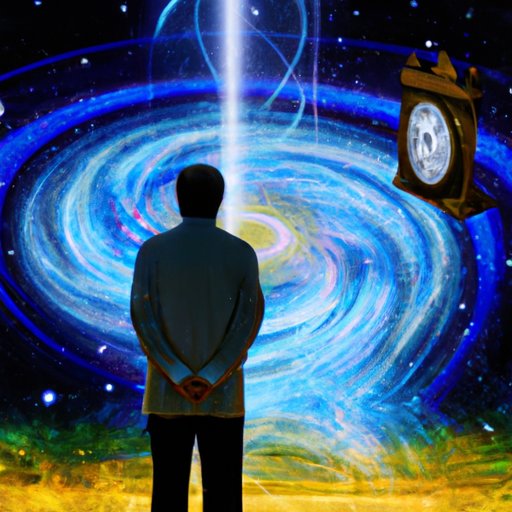Introduction
Time travel has been a source of fascination for centuries. From ancient stories to modern movies, the idea of traveling to different points in time has captivated our imagination. But is time travel actually possible? In this article, we’ll explore the theoretical and real-world possibilities of time travel and examine what science and history have to say about it.

Examining the Theoretical Possibility of Time Travel
When it comes to considering the possibility of time travel, there are two main areas that need to be explored: philosophical arguments and concepts in physics. Let’s look at each of these in turn.
Examining Philosophical Arguments for and Against Time Travel
Philosophers have long debated whether or not time travel is possible. According to physicist Paul Davies, “The consensus among philosophers seems to be that time travel is impossible.” However, there are some who argue that it is possible. For example, philosopher David Lewis argued that time travel could be achieved via “closed timelike curves,” which are hypothetical paths through spacetime that allow a person to travel back in time.
Analyzing Concepts in Physics That Could Potentially Allow for Time Travel
In addition to philosophical arguments for and against time travel, scientists have also looked to physics for answers. One concept that has been explored is the idea of a wormhole, which is a tunnel connecting two points in spacetime. This could potentially allow a person to travel from one point in space to another, and even to another point in time. Another concept that has been examined is the notion of time dilation, which suggests that time passes more slowly for objects moving at high speeds relative to other objects. This could theoretically allow a person to travel into the future.
Exploring Real-World Examples of Time Travel
While the theoretical possibility of time travel is interesting, there are also real-world examples that have been explored. Let’s take a look at two of these: claims of time travelers who have visited the past, and alleged time machines.
Examining Claims of Time Travelers Who Have Visited the Past
Over the years, there have been numerous claims of people who have traveled back in time. For example, in the early 2000s, a man named John Titor claimed to be a time traveler from the year 2036 who had come back to the year 2000. While his story has been debunked as a hoax, it still serves as an interesting example of a real-world claim of time travel.
Investigating Alleged Time Machines
In addition to the claims of time travelers, there have also been reports of actual devices that can allegedly facilitate time travel. For example, a device called the “Time Machine” was developed by a French inventor in the 1930s. While the inventor claimed to have successfully tested the device, it was never proven to work, and the plans for the device have since been lost.
Analyzing Historical Accounts of Time Travel
In addition to real-world examples, there are also numerous historical accounts of time travel. Let’s look at two examples: stories from ancient texts, and legends and myths involving time travel.
Looking at Stories from Ancient Texts
Many ancient cultures have stories of time travel. For example, in Hindu mythology, there is the story of King Raivata Kakudmi, who travels to the heavens and meets Brahma, the god of creation. In Greek mythology, there is the tale of Odysseus and the Cyclops, where Odysseus travels back in time to meet the Cyclops Polyphemus. These stories suggest that time travel has been a part of human mythology for thousands of years.
Examining Legends and Myths Involving Time Travel
In addition to stories from ancient texts, there are also numerous legends and myths involving time travel. For example, the Native American legend of the Thunderbird tells the story of a bird that can travel back and forth in time. Similarly, the Chinese myth of Nüwa and Fu Xi tells the tale of two gods who travel back in time to save humanity. These legends suggest that time travel has been a part of human culture for centuries.

Investigating Scientific Evidence for Time Travel
In addition to examining historical accounts, scientists have also looked to the physical world for evidence of time travel. Let’s look at two examples: experiments that suggest time travel is possible, and studies that disprove the possibility of time travel.
Discussing Experiments that Suggest Time Travel is Possible
There have been a number of experiments conducted that suggest time travel may be possible. For example, a team of physicists from the University of Queensland conducted an experiment in which they sent a laser beam back in time using a special type of mirror. While the results of the experiment were inconclusive, it does suggest that time travel may be possible in some form.
Examining Studies That Disprove the Possibility of Time Travel
In addition to experiments that suggest time travel is possible, there have also been studies that disprove the possibility of time travel. For example, in 2017, a team of physicists from the University of Oxford published a study that concluded that time travel is “highly unlikely” due to the laws of physics. While there is still much research to be done, these studies suggest that time travel may not be possible after all.
Examining Popular Culture’s Take on Time Travel
Finally, let’s take a look at how popular culture has depicted time travel. To do this, we’ll examine two examples: movies and TV shows that feature time travel, and video games that use time travel as a plot device.
Examining Movies and TV Shows That Feature Time Travel
Time travel has been featured in countless movies and TV shows over the years. For example, the classic movie Back to the Future follows the adventures of Marty McFly as he travels back in time to save his family. Similarly, the show Doctor Who follows the titular character as he uses a time machine called the TARDIS to explore the universe. These examples show that time travel is a popular theme in popular culture.
Discussing Video Games That Use Time Travel as a Plot Device
Time travel has also been used as a plot device in many video games. For example, the game Chrono Trigger follows a group of adventurers as they travel through time to prevent a global catastrophe. Similarly, the game Prince of Persia: The Sands of Time follows the protagonist as he attempts to undo a mistake he made while using a magical artifact to travel through time. These examples show that time travel is a popular theme in video games as well.
Conclusion
In conclusion, time travel has been a source of fascination for centuries, and there are numerous theories and real-world examples that suggest it may be possible. From philosophical arguments to historical accounts to scientific evidence, there is much to explore when it comes to the topic of time travel. And while there is still much research to be done, it’s clear that time travel will continue to captivate our imaginations for years to come.
Summary of Findings
This article examined the theoretical and real-world possibilities of time travel. We looked at philosophical arguments for and against time travel, concepts in physics that could potentially allow for time travel, real-world examples of time travel, historical accounts of time travel, scientific evidence for time travel, and popular culture’s take on time travel. While there is still much research to be done, it’s clear that time travel will continue to captivate our imaginations for years to come.
Final Thoughts on Time Travel
Time travel is an intriguing concept that has captured the imaginations of people for centuries. While it may seem like something out of a science fiction novel, there are many theories and real-world examples that suggest it may be possible. Whether or not time travel is actually possible remains to be seen, but it’s clear that it will continue to fascinate us for years to come.
(Note: Is this article not meeting your expectations? Do you have knowledge or insights to share? Unlock new opportunities and expand your reach by joining our authors team. Click Registration to join us and share your expertise with our readers.)
